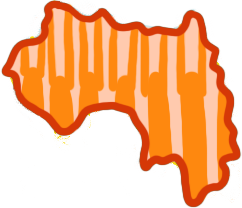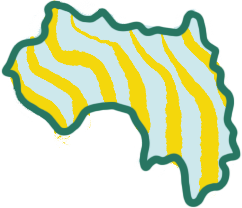Text
Pretty much the first thing that you need to learn when starting a new language is how to greet people.
In this chapter, we are focusing on "standard" greetings in Maninka. While things can differ slightly in Jula and Bambara, if you use what follows, you'll be understood by pretty much anyone who speaks Manding.
Four times of day
There are four primary greetings to use depending on the time of the day. They all follow the same format, which looks like this:
I ni+ TIME OF DAY
You will vary "Time of day" by one of the following:
sɔɔma= morningtele= day; sunwura= afternoon; early eveningsu= night
So this gives you the four following options for typical greetings depending on the time of day:
I (ni) sɔɔma= Good morningI ni tele= Good dayI ni wura= Good afternoonI ni su= Good evening
(NOTE: In spoken Maninka these days, people typically drop the ni when saying the morning greeting: I sɔɔma! 'Good morning!' For our purposes, I'll will often write the fuller former that includes ni)
There are not firm rules about the exact time (e.g., 10:30am) at which one moves between the four times.
For many Manding speakers, Muslim prayer times play an important role in their sense of when we have gone from tele to wura.
You'll eventually get a feel for when it's best to use one over the other. In the meantime, here's a rough approximation of when to use the greetings:
sɔɔma
early morning noon-ishtele
noon-ish to 3pm-ishwura
3pm-ish to night time propersu
night time proper until the sun begins to rise
Singular vs. Pural: 'You and'
Literally, i ni means 'you and'. So in the strictest sense a greeting like i ni sɔɔma means 'You and the morning'.
More specifically, i is the singular form of 'you'.
This means that greetings like i ni + sɔɔma, wura, etc., are for greeting a single person.
To greet multiple people in Maninka, one replaces i with á or álu.
The words á and álu are different forms of the same thing: the second person plural pronoun, 'you all'. (You will learn more about the details in "Pronouns".) They are interchangeable for the purposes of greetings!
(The word álu can also be written as alu if you are not marking tone. Yes, Manding is a tonal language, but let's not worry about that for now either!)
So to greet a group of people in the morning, you would say:
Álu ni sɔɔma
'Good morning' (to a group of people)
This same principle applies to all the other times of day as well:
Álu ni+ ...
sɔɔma= 'Good morning', etc.telewurasu
So you have two second person pronouns as options when greeting people:
i= 'you' (singular)álu= 'you all; you guys, etc.'
For your purposes, it is probably best to simply learn the "standard" Maninka way of using i for greeting one person and álu for greeting multiple people. Everyone understands the standard forms and you can always adapt your own usage down the road based off what you hear most often!
Responding
Alright, so you know how to greet people! But how do you respond? Greetings are an extended affair in West Africa; we'll cover more of what goes into them down the road.
For now, let's focus on the following two-step sequence for responding:
nba/nse= call-and-response interjection- Repeating the appropriate
i/álu ni+ time of day
If anyone greets you using any of the forms that you learned above (i ni sɔɔma, á ni su, etc.), you need to (1) respond with one of the two forms depending on your gender identity:
nba= malense= female
From there, you (2) can simply repeat the time of day greeting that they used with you.
(NOTE: In "Greetings Extended", we'll cover alternative ways of responding after nba/nse; repeating the time of day greeting is typical)
So here's an exchange where someone greets a woman in the morning:
– I ni sɔɔma!
– Nse! I ni sɔɔma!– Good morning!
– Nse! Good morning!
Note how I didn't translate nse in the second line. That is because both nse and nba are call-and-response interjections that don't lend themselves to a convenient one-to-one translation in English.
You also use nba/nse when you are responding to a greeting that was addressed to you as a part of a larger group of two or more people:
– Álu ni sɔɔma!
– Nba! I ni sɔɔma!– Good morning! (to multiple people)
– Nba! Good morning! (responding back to one person)
Finally, keep in mind that responding with nba/nse should be automatic when you hear I/álu ni + .... It's not optional. Without it, you have not properly acknowledged a greeting and the person who said it.
Greeting with activities
In addition to greeting with the time of day, we can also greet with an activity or a context. To do this, we keep the same structure, but we replace sɔɔma, tele, etc., with a noun befitting of the context:
I/álu ni+ ACTIVITY
So, for instance, if you saw a friend who was working and you wanted to say hello, you might use the word baara ('work') to say something like:
I ni baara!
You + and + work'Hello' (to someone that is working)
Or if you hadn't seen some friends in a long time, you might use the word fama ('absence') to say something like:
Álu ni fama!
You.all + and + absence"Hello" (but with a meaning of "It's been a long time!" attached to it)
There's a wide range of nouns that are commonly used to greet with this additional meaning of context. You'll pick them up as you go along, but here's a few to get you started for now:
lɔɔ= market (as in, "Hello" while at the market)tunun= loss; disappearance (as in, "I haven't seen you in a while" or "Where you been, man?")taama= travel (as in, "Hello" to someone that is engaged in or just returned from traveling)sɛnɛ= arrival (as in, "Welcome!"; there's also an alternative expressionI/Álu dansɛwithoutnithat is used to say 'Welcome" in many Jula-speaking areas)
And then, there's one slightly idiomatic one, which is arguably the most useful and frequent:
-
ke= "Thank you" or "Hello"Historically,
kelikely comes from a word that means 'farm labor' (seeci'labor'). In this way, we can think of it as coming from an expression that meant something close to "You and (your) labor!". In turn, this expression is now a general way to recognize someone's good actions ("Thank you") or a polite way to say "Hello".
In any case, you will always respond to these I/álu ni + ACTIVITY greetings in the same way you do with the times of day: by using nba/nse.
Multiple greeting phrases in one exchange
Multiple i/álu ni + ___ phrases can and often do occur in a single greeting exchange between people.
For instance, if your old friend returned in early evening from travels after a really long time away from home, you might greet her by saying:
– I ni wura!
– Nse!
– I ni sɛnɛ!
– Nse!
–I ni taama!
–Nse!
–I ni fama!
–Nse!
In English, each one of these sentences would require a totally different structure (e.g., "Hi! Welcome back! How was your trip? It's been so long!"), but in Maninka, you can simply use different types of I/álu ni + ___ greeting phrases.
Because of this, it is really important that you focus not on necessarily understanding what the word that comes after I/álu ni is, but rather on recognizing I ni + ___ or Álu ni + ___ and being able to respond automatically with nba or nse.
Got it? I ni baara! Nice work!
Summary
Ayiwa! We covered the following about greetings:
- Greetings are formed like this:
I ni(singular) orálu ni(plural) + time of day
- There are four times of day for greeting:
sɔɔma= morningtele= middaywura= afternoon/early eveningsu= night
- One responds in a two-step process like this:
nba(male) ornse(female)- repeating the appropriate time of day greeting (e.g.,
I ni sɔɔma, etc.)
- Greetings can also be used with nouns that define the context of one's hello (e.g,
I ni baara'Hello (to someone that is working)') - Multiple
I/álu nigreetings can appear in one larger sequence of greetings
Vocab
Coming soon n'Ala sɔnna!
- i
- you
- álu
- you (plural)
- I/álu (ni) sɔɔma
- Good morning
- I/álu ni tele
- Good day
- I/álu ni wura
- Good afternoon
- I/álu ni su
- Good evening
- Nba
- male greeting response
- Nse
- female greeting response
- I/álu ni baara
- Hi (to someone working)
- I/álu ni fama
- "It's been a long time"
- I/álu ni tunun
- "I haven't seen you in a while"
- I/álu ni taama
- You and travel
- I/álu ni lɔɔ
- You and the market
- I/álu ni sɛnɛ
- Welcome
- I/álu dansɛ
- Welcome [Jula]
- I/álu ni ke
- "thanks"; "hi"
Vocab list will be here someday!
Flashcards will be here someday!
Exercises
Exercises will be here someday!




